- Home
- J. Clifton Slater
Clay Warrior Stories Boxset 2 Page 3
Clay Warrior Stories Boxset 2 Read online
Page 3
“What do you need, Centurion?” Peregrinus inquired while letting his eyes drift over the Legion lines.
“A ballista or two would be nice, Tribune,” the line officer replied in jest.
“Let me see what I can do,” Peregrinus announced as he reined his horse around and kneed it towards the gate.
The Centurion was shocked. He was only teasing the young Tribune.
***
Peregrinus rode towards the stockade, guided the horse in an arc, and approached the gate from the west. His eyes on the Tiber river to his left, he didn’t look around until the steed was galloping straight for the gate.
When he looked forward, to his horror, his horse was bearing down on a wedge of Legionaries. The reins just began to tighten when the wedge parted as would a gate. Looking back, he watched as the wedge closed behind him. Then he was through the gate and driving his horse towards the transport wagons.
“First Engineer! First Engineer,” he yelled as he vaulted to the dirt.
“Tribune. What can I do for you?” the engineer asked.
“Do you have ballistae in those wagons?” he demanded.
“Why yes. But this is an assault, not a siege,” remarked the Legion’s First Engineer.
“Not anymore. The Legion is engaged almost a mile from here and we have mounted barbarians coming from upriver,” Peregrinus explained. “We have one chance to slow them down and give the Legion a chance. We need artillery.”
“In the field?” the Engineer asked, his eyes widening in disbelief.
Peregrinus looked at the log walls the Legionaries had constructed just a day ago. From the piled dirt to the trenches in case the walls were breached to the top of the logs.
“No, First Engineer. From in here,” Peregrinus stated. “Over the walls. Can you do it? And I mean fast.”
“Well, yes. But I need authorization from command staff,” the engineer stated.
“The command staff is about to be overrun. They are out in the field fighting for their lives. If I had time, I would go and get one for you,” Peregrinus said before stopping and realizing he was whining as he did when he was a little lad. He straightened his shoulders, locked eyes with the engineer and announced. “I am Pollenius Armenius Peregrinus, a Tribune for the Legion of Consul Quintus Gurges. By my authority, you will bring your ballistae to bear on the enemy. Or, I shall execute you right here by my own hand with my own gladius.”
Peregrinus hadn’t realized he’d rested his hand on the pummel of his weapon. The Legion’s First Engineer had, and he reacted to the threat.
“Right away, Tribune,” he shouted as he turned to the mule drivers, material handlers, and his artillery staff. “That wagon and that wagon, to the north wall. You, other men, pull the tarps and unwrap the bolt throwers.”
“The barbarians are coming, First Engineer,” Peregrinus challenged as he jumped onto his horse. “And the Legion is depending on you.”
He wheeled around and urged the horse towards the gate. As the steed galloped for the gate posts, he shouted a warning.
“Coming through,” he yelled. The wedge parted and he shot through, rolled right, and raced for the Legionaries blocking the northern approach.
***
The Insubri were superb horsemen. Many tales sang the lie of charging to battle on a pony stretched out in full flight. But the northern tribesmen knew better. Men would be there to kill if you ran at them or took half a day to walk the distance. An Insubri warrior would only rush the last twelve inches and that was to stab you through the heart. They would never mistreat a fine mountain pony by wearing it out before a battle.
And so, it was for the fifteen hundred warriors coming down the bank of the Tiber river. They walked, slow and steady as if stalking prey.
***
As Peregrinus rode around the corner of the camp, he saw a cluster of Centurions. Standing in the center was old Centurion Seneca. Every time he spoke, the other officers responded in the positive by word or body language.
“Tribune Peregrinus,” Seneca announced in greeting as Peregrinus dismounted. “Care to inspect the formation?”
“Centurion. I’d like to inspect the formation,” admitted Peregrinus. “If you’ll teach me about the why-of-it as we walk.”
A sharp whistle interrupted their conversation. Seneca raised his hand to his brow and searched beyond the lines of Legionaries.
“That lecture will have to wait, Tribune,” Seneca explained. “And don’t sit your horse. Those are Insubri warriors. They grew up shooting birds on the wing. I wouldn’t think a Tribune on a horse would be much of a challenge for them.”
“What do I do, Centurion?” Peregrinus asked and realized it came out odd because his teeth were chattering.
“You walk behind the line. Every fifth man, you slap him on the shoulder and tell him to kill one for your father,” stated Seneca. “At the next legionary, ask him to kill one for your mother. When you run out of blood thirsty relatives, invent a few more. Work your way up and down the line.”
“It doesn’t seem like enough,” pleaded Peregrinus.
“When you face death or take a life, it’s nice to know you’re doing it for an officer who cares,” explained Seneca. “That’s really all it takes. Be a Tribune, who cares.”
Chapter 5 – The Northern Approach
The Insubri gathered just out of javelin distance. Sitting astride their ponies, they pointed out the shields and made a point of counting the number of Legionaries standing across the trail.
They could have turned, ridden up the hill and circled around but, the Legionaries seemed to tickle the northern tribesmen. The Legionaries, on the other hand, found the situation anything but humorous.
Peregrinus glanced down the line and noted the Centurions casually speaking with the men. He swallowed his fear and stepped towards the back of the closest Legionary.
“Kill one for my father,” he mumbled.
The Private turned his head and asked, “Pardon Tribune. Did you need something?”
Peregrinus hesitated. His experience with common Legionaries had been passing on an order or during an inspection with the General’s staff. He really had no idea how to approach one or how to motivate the men. Then he lifted his eyes to the Etruscī warriors and swallowed.
“Yes, kill that cūlus on the brown pony for me,” Peregrinus instructed.
“That one on the right?” the Legionary asked while pointing with his javelin. Three other helmets turned to listen.
“Yes, him. And if you can manage it, the one beside him,” Peregrinus said.
“We can do that for you, sir,” another Legionary assured him.
“How about the one on the other side?” a Legionary chimed in.
“Look, I don’t mean to over tax your unit, but yes,” Peregrinus stated. “I don’t like his looks. He’s too ugly to live.”
Then Tribune Peregrinus walked away and counted off five Legionaries. Before he could say anything to the new group, one of the original Legionaries shouted to the men in front of him.
“Ask the Tribune which ones to kill,” the man roared. “Seems the Insubri are offensive to the Tribune’s sense of beauty. Ask him which ones are too ugly to live!”
“They’re all ugly, sir. Which ones are particularly offensive?” a Legionary asked.
“The one on the red pony,” Peregrinus replied.
“Too ugly to live?” the Legionary asked.
“Absolutely. Can you kill him for me?”
“Yes, sir. It’ll be our pleasure.”
When Seneca passed Peregrinus, the Tribune working his way up the ranks and the Centurion down the ranks, the Centurion slammed a fist to his chest in a cross-chest salute.
“Too ugly to live, Tribune?” Seneca asked.
“It’s all I could think of to inspire the men,” admitted Peregrinus. “Sometimes, it takes a cultured eye to recognize true grossness.”
“Indeed, it does, Tribune Peregrinus,” Seneca stated as he mov
ed to approach another section of Legionaries. It took him a moment to replace the grin with his war face.
***
By the time the Insubri notched and unleashed the first volley of arrows, the Legionaries were calling and challenging the warriors. But it got serious when fifteen hundred mounted men kneed their ponies and pulled their swords.
The Legionaries threw javelin after javelin but still, the riders came at the double line. Bravado faded as the ground began to shake and rumble from hooves pounding the earth. Over their shields and from under their helmets, the Legionaries’ vista went from a riverbank with green hills beyond, to heaving chests of men and ponies.
“Brace, brace, brace,” cried out the Centurions and NCOs so they could be heard above the roar.
Just as the first rank of ponies struck the Legion line, three loud, sharp twangs cut the air. Followed by long bolts that each tore through three riders before burying itself in a fourth’s pony. Combined with the injuries from the javelins, the gladii strike, and the additional twelve warriors to fall from the bolts, the Insubri veered off and circled around to their original location. It was a big mistake. The ballistae sang out again and more Insubri fell to the riverbank.
***
The mounted warriors jerked their ponies around and further up the riverbank, they nudged their mounts onto the side of a hill.
“Who ordered the artillery?” a Sergeant asked.
Centurion Seneca walked up and in a loud voice announced, “That would be Tribune Peregrinus who saved your ugly hides. Now, if you don’t have any more questions, we need to get to the Legion.”
Insubri warriors were cresting the hill. In a short while, they would reach the battlefield and have a straight run at the Legion’s back.
“I thought we didn’t have enough men to be effective on the field?” commented Peregrinus.
“We don’t. What we’ll do is set up a catch line,” Seneca instructed. “An island of strength for retreating units. It’ll be a rallying point and a safe zone for the wounded.”
“Then we should get going,” Peregrinus stated.
“No Tribune. We’re going. You’re needed here,” advised Seneca. “The survivors will be staggering in with no direction and a broken command structure. As a staff officer, you have the authority to keep the gates clear and assign work details. Until the General and his staff arrive, you’re in command of the camp.”
Peregrinus stood watching as the Legionaries jogged to the west. For a moment, he fumed at being left behind. Then a thought crossed his mind. Would his father believe he was in command of a Legion fortification? Even if only for a little while? Grabbing the reins, he jumped onto the horse’s back and urged the animal towards the main gate of his Legion’s camp.
***
Alerio Sisera leaned on a javelin and watched the small figures in the distance. Because of the long sloping plain and the steep grade leading up to Volsinii, he had an excellent view of the fighting.
The maniples were attempting to break contact. But the long lines of Legionaries were breaking down as the Etruscī and their allies concentrated on weak sections. In spots, the tribesmen vaulted through gaps, circled around, and attacked the Legionaries from the rear. Each break created pockets of small units that were soon surrounded. Almost as if the Legion were a giant centipede being chopped into pieces, each segment that separated from the main body struggled to survive.
Although the ends and some flanking elements fought individual battles, the center lines of the Legion were fighting as a unit. In another twenty paces, the Legionaries would reach the relatively flat ground and could form a defensive fighting square. The moveable formation would allow them to fight their way back to the camp.
Alerio was so focused on the fighting, he didn’t hear or see the horse line up with the gate. When he did, he shouted to alert the Legionaries behind him and stepped out of the way. As he moved, his eyes noticed the line of Insubri ponies snaking down a far hillside. The race between the Legion getting off the slope, and the Insubri warriors joining the fight played out in his mind over and over again. Sometimes the Legion reached the plain and formed up. Other times, the Insubri reached the Legion while it was still strung out and vulnerable.
“Lance Corporal Sisera. Right?” a voice demanded.
Alerio broke from his trance and turned to find himself looking at the side of a horse. Shifting his gaze up, he recognized the rider.
“Yes, sir,” Alerio replied to the angry young Tribune.
“What do you need to hold this gate?” Peregrinus inquired.
“I’d like to have time to partially bury a wagon on either side of the gate to protect my men,” Alerio answered. He indicated spots a few yards outside the rows of Legionaries leading back to the gate posts.
Peregrinus studied the gate and the approaches to the opening in the stockade wall.
“The ground’s too hard to get them deep enough,” the Tribune commented. “Let me see what I can do.”
With those words, Tribune Peregrinus kneed his horse and trotted into the camp. Alerio watched the young nobleman leap from his horse while shouting at the mule handlers and wagon drivers. Then, the Lance Corporal spun back to the battlefield.
The back two maniples broke off the battle line and ran down the slope. From this distance, Alerio couldn’t tell which maniples broke contact, or which was left on the front line alone to fight the Etruscī. He was of two minds. If the veterans were left on the line, then the rookies and experienced Legionaries would form the square. But the powerful veterans, the core of the Legion, would be decimated during the fighting retreat. If either the newest or experienced Legionaries were left behind, most would die but, the defensive square would be stronger. It became a null subject when the mounted Insubri warriors hit the retreating Legionaries from the rear.
Three horses broke from the mess of the battle. As they drew closer, Alerio relaxed, the riders wore Legion armor. The one in front, its rider kneeing the flanks hard, pulled ahead of the other two. Behind the lead horse, the riders slumped, and it seemed the horses were following the first horse rather than being guided by the Legionaries. A mounted Tribune reached the wedge. Without slowing, he rode by Alerio and disappeared into the camp.
The other two horses slowed as they approached the gate detail. Both riders were from the cavalry and both had wounds. Alerio called two Legionaries over and had them lead the horses into the camp.
“Nice of the Tribune to help the cavalrymen,” Drustanus said out of the side of his mouth.
“Stow it, Private,” warned Alerio. “We don’t know if he was carrying orders.”
“Or running from a fight,” Cimon added.
Noises behind Alerio drew his attention and he spun to see what caused the racket.
***
Two wagons came through the gate being pushed by mule handlers and wagon drivers. Behind them, Tribune Peregrinus marched out holding two torches.
“One wagon on each flank,” he directed while pointing with the torches. “Leave space between the stockade wall and the back of the wagons. We don’t want to burn down the camp.”
As the wagons were pushed into position, Peregrinus smiled at Alerio.
“No time to dig,” the Tribune announced as he tossed one torch into a wagon. The bed flared up in bright blue flames. “So, we’ll use fire to keep them off your flanks.” With that, he tossed the second torch into the other wagon.
“Pretty flames, Tribune,” commented Alerio. “What did you use?”
“Goat grease. The Legion will be short of lubricant, but this seemed to be the more pressing issue.”
“Yes, sir. And just in time,” Alerio said as he raised a javelin and shouted to his detail. “We are here for one reason. Protect the gate.”
Before the Legionaries could respond, Alerio whirled around and launched the javelin. It shot high into the air before arching over and diving towards the ground. Before it touched dirt, the iron tip pierced the chest of the lead
ing Insubri warrior. He toppled off the pony and was trampled by the hundred horsemen following him towards the gate.
In a flash, the sky was filled with javelins. As the shafts fell, mounted warriors pierced through chests, arms or shoulders, fell with them. But there weren’t enough javelins, so the ponies continued to rush forward.
In a typical cavalry charge, the mounted warriors favored attacking from the side and chipping away at an armored formation. Gallantly charging through the enemy’s lines in a rush of glory was the ultimate goal. But, plowing into the heart of an enemy’s formation was a quick death for a horseman and his mount. With the burning wagons preventing a side attack, and the obvious suicide offered by the deep wedge formation, the Insubri warriors dismounted and charged the gate on foot.
Under his helmet and with his face hidden from the tribesmen by his shield, Lance Corporal Alerio Sisera smiled. On the backs of their ponies, the Insubri posed serious problems for the infantryman. On the ground, the warriors entered his arena. Alerio’s smile reflected the anticipation of them entering his kill zone.
Chapter 6 – Battle for the Gate
“Cimon! Drustanus! Back four and hold,” Alerio shouted. “We’ll bring them to you.”
Behind Alerio, the two pivot men shifted and stepped back. They moved into positions on the outside shoulders of the fourth Legionaries in the wedge.
The fastest warriors crashed into Alerio. The Lance Corporal applied only enough resistance to prevent them from passing his shield. While they shoved and attempted to reach him with their long swords, Alerio stepped back. Their blades hacking at the moving shield.
On the fourth pace back, the shields from the next two Legionaries in the wedge joined Alerio’s. They used the shields to hold the Insubri at bay. The three stepped back and on the fourth pace, two additional shields locked into position. The five Legionaries continued the controlled retreat.
In the eyes of the charging tribesmen, it appeared the Legionaries were collapsing and trying to reach their camp. They bunched up and shoved forward. Every one of the Insubri wanted to be the first to break through the withdrawing Republic’s soldiers. Being this close to the gates fueled their fury and thirst for glory. However, it also made them overconfident.

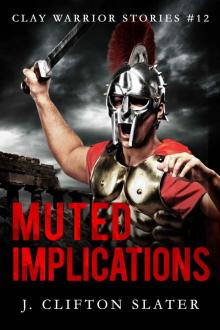 Muted Implications (Clay Warrior Stories Book 12)
Muted Implications (Clay Warrior Stories Book 12)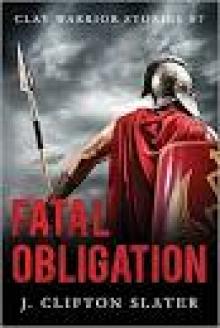 Fatal Obligation
Fatal Obligation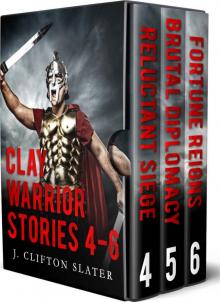 Clay Warrior Stories Boxset 2
Clay Warrior Stories Boxset 2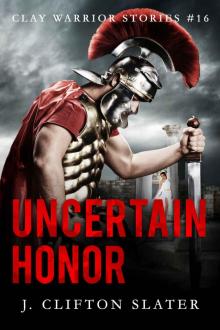 Uncertain Honor
Uncertain Honor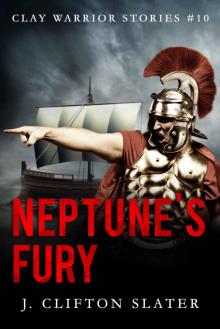 Neptune's Fury
Neptune's Fury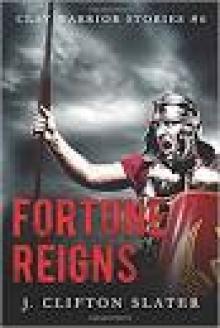 Fortune Reigns
Fortune Reigns Op File Treason
Op File Treason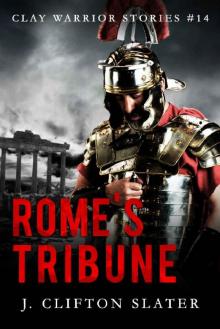 Rome's Tribune (Clay Warrior Stories Book 14)
Rome's Tribune (Clay Warrior Stories Book 14) Clay Warrior Stories Boxset 1
Clay Warrior Stories Boxset 1 Serpent Circles
Serpent Circles Reluctant Siege
Reluctant Siege Infinite Courage
Infinite Courage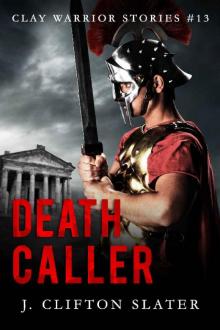 Death Caller (Clay Warrior Stories Book 13)
Death Caller (Clay Warrior Stories Book 13) Op File Sanction
Op File Sanction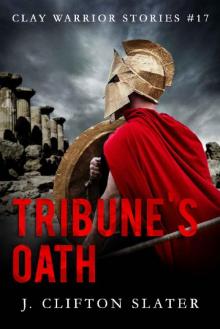 Tribune's Oath (Clay Warrior Stories Book 17)
Tribune's Oath (Clay Warrior Stories Book 17) Galactic Council Realm 1: On Station
Galactic Council Realm 1: On Station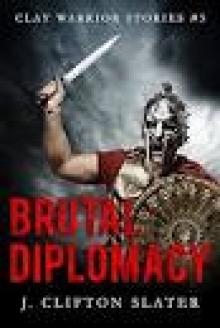 Brutal Diplomacy
Brutal Diplomacy Op File Revenge
Op File Revenge On Point
On Point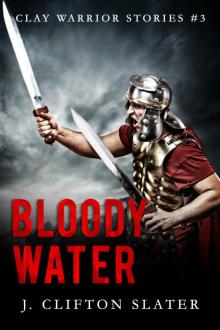 Bloody Water (Clay Warrior Stories Book 3)
Bloody Water (Clay Warrior Stories Book 3)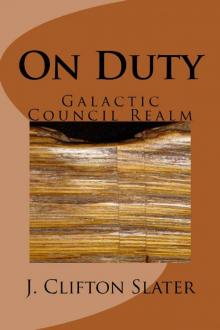 Galactic Council Realm 2: On Duty
Galactic Council Realm 2: On Duty Galactic Council Realm 3: On Guard
Galactic Council Realm 3: On Guard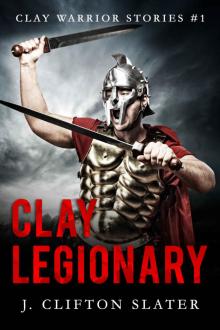 Clay Legionary (Clay Warrior Stories Book 1)
Clay Legionary (Clay Warrior Stories Book 1) On Point (Galactic Council Realm Book 4)
On Point (Galactic Council Realm Book 4) Op File Revenge (Call Sign Warlock Book 1)
Op File Revenge (Call Sign Warlock Book 1)